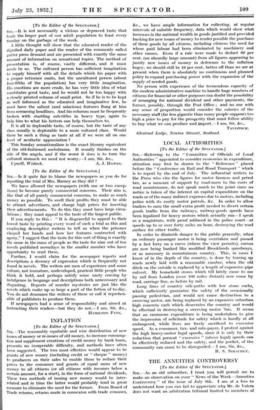LOCAL AUTHORITIES
[To the Editor of the SPECTATOR.] SIR,—Referring to the "Committee of Officials of Local Authorities" appointed to consider economies in expenditure, attention may first be drawn to the " Reference " placed before the "Conference on Rail and Road Transport" which is to report by the end of July. The influential writers to the Press who cite the figures for motor licences and petrol tax, as a measure of support by road-users to the costs of road maintenance, do not speak much to the point since no notice is taken of the interest on capital expenditure on the roads or of the many indirect expenses due to motors, including police with its costly motor patrols, &c. In order to allow traders to earn the small extra profit needed to divert certain goods traffic from the railways, railway-goods speeds have been legalized for heavy motors which actually run—I speak as s a magistrate, with proof adduced in the police court—at speeds up to or over forty miles an hour, destroying the road surface for other traffic.
In order to diminish danger to the public generally, when an ordinary passenger motor is being overtaken and passed by a fast lorry on a curve (where the view permits), curves are now being banked like modified Brooklands speedways, or as necessary in mountainous country. This, in cases I know of in the depth of the country, is done by tearing up roads newly laid with a reasonable camber, when the old ditch on the outside is replaced by a length of expensive pipe culvert. My household stores which till lately came to me by rail from London (over 100 miles distant) now come by road, carriage free, as before by rail.
Long lines of country side-paths with low stone curbs, which sufficiently guarantee the safety of the occasionally passing pedestrian, and would not cause destruction to a swerving motor, are being replaced by an expensive suburban high concrete curb which desecrates the country and would be effectual in destroying a swerving motor 'bus. It seems that an enormous expenditure is being undertaken to give the impression of solicitude for safety which is hardly at all endangered, while lives are freely sacrificed to excessive speed. As a consumer, tax- and rate-payer, I protest against the high heavy-motor legal speeds, since it is only by their reduction that present " excessive " (above legal) speeds can be effectively reduced and the safety, and the pocket, of the community can cease to be disregarded.—I am, Sir, &c.,
R. S. STRACHEY.














































 Previous page
Previous page